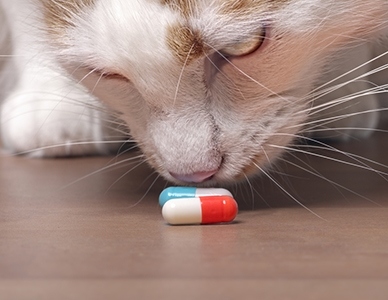pet Poison
Prevention
Take a minute to ‘paws’ and think about Poison Prevention.
Pet Poison Prevention
What is poisonous to my pets?
For 47 years the National Safety Council has spread awareness of poisoning dangers in humans. Likewise, Colonial Manor Animal Hospital takes this opportunity to encourage all of our pet owners to learn about potential dangers to their pets and what to do if they are exposed.
Foods and Food Additives
Human Foods can cause everything from nausea and vomiting to tremors and liver failure. Here are some of the more common items:
Human Drugs
Common pain relievers like Ibuprofen and Acetometaphine, as well as Anti-depressants, and so many more medicines, can harm your pet!
Common human drugs can cause serious harm to your pets when ingested. Everything from intestinal ulcers to kidney disease, and neurological problems. Human medications in combination with pet medication can cause adverse effects.
If your pet has ingested any human medications call our office or the Pet Poison Helpline immediately to determine if your pet needs emergency help.
Plants and Flowers
So many plants can cause severe toxicity in pets!
Daffodils, Lillies, Tulips, Poinsettia, Hyacinths, and Iris or bushes like Azaleas and Rhododendrons are toxic to dogs and cats!
If you’re unsure of a plant look it up here: ASPCA poison control plant library.
Fertilizers, Pest Control & Chemicals
As you encourage your plants to grow, make sure you read the warnings on all plant products. If you need more information, call the product’s company. Their contact information should be listed right on the packaging.
Beware of Cocoa mulch! It is made from the same plant as chocolate and can cause the same problems to your pet as eating chocolate candy would.
Also, pest baits for rodents, slugs, or snails are also severely toxic to pets and can cause death.
If your pet has ingested any type of fertilizer or pest control, please have the product packaging available before contacting your veterinarian or the Pet Poison Prevention Helpline.
If you think your pet has ingested something poisonous, it is always best to get help immediately, rather than waiting until your pet is showing severe symptoms.


